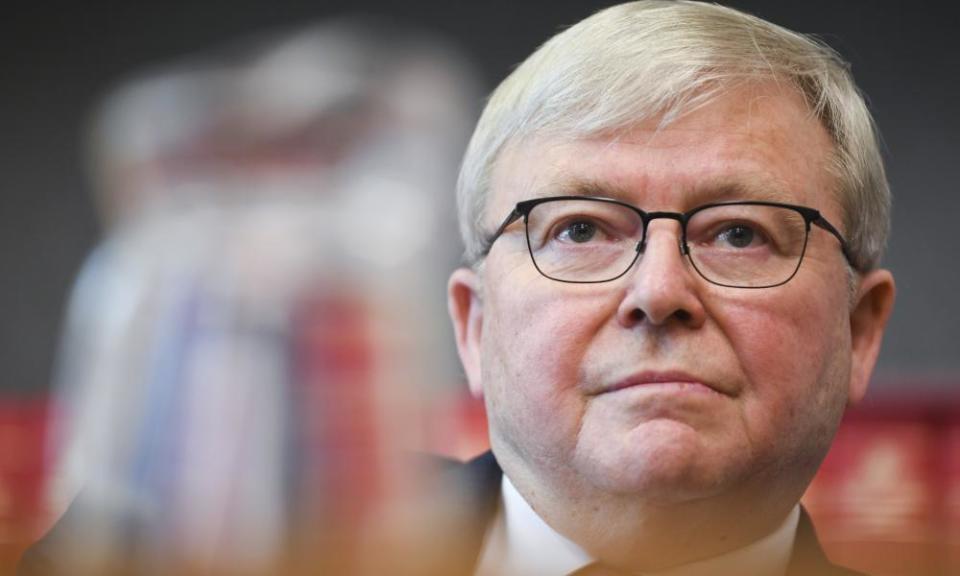Kevin Rudd registers interviews with BBC and Radio NZ but insists 'I am not a foreign agent'

The former Australian prime minister, Kevin Rudd, has added details of his media interviews with overseas broadcasters to the country’s foreign influence register after a running battle with the Attorney General’s Department over his disclosure obligations.
Rudd registered unpaid interviews with seven broadcasters including the BBC, Radio NZ and a Chinese state-owned media group accompanied by a statement chastising the department for its “strange view” of the extent of his registration requirements.
“I am not an agent of foreign influence and any such suggestion is forcefully rejected,” Rudd states in the “description” section of the register.
Related: Kevin Rudd to register under foreign influence scheme but labels government guidance 'absurd'
“I engage internationally as an individual, a scholar, a commentator, a former leader and in my roles with non-government and UN-affiliated institutions – never as an agent on behalf of any foreign government.”
Guardian Australia reported last month that Rudd would add himself to the register of foreign influence after being informed by the Attorney General’s Department that live interviews with state-owned broadcasters, such as the BBC, could trigger obligations.
At the time, the former prime minister told the department he fully supported the foreign influence registration regime “but your sweeping interpretation of what constitutes an arrangement with a foreign principal potentially captures any engagement I have with any foreign government, or those tangentially connected to them”.
“Nonetheless, I am complying with this interpretation by disclosing on the public register that … I have communicated with entities or individuals that are closely associated with these jurisdictions,” Rudd told the then secretary of the department, Chris Moraitis, before listing 35 countries including China, France, Japan, Russia, the UK and the US.
But in an update to the register that went live on Thursday afternoon, Rudd discloses interviews with seven entities: the BBC, Radio New Zealand, Dutch Broadcasting Foundation, Deutsche Welle, China Media Group, Korean Broadcasting System and TVOntario.
In a message that appears on the public register, the ex-Labor PM writes that the acting departmental secretary, Iain Anderson, had now “expressed a much narrower interpretation of my obligations under this scheme’s special requirements for former cabinet ministers than was expressed by his predecessor”.
Rudd says Anderson indicated that “merely communicating with a foreign principal or a person/entity from an international jurisdiction is not in itself a registrable activity ... Similarly, merely meeting with a foreign government – at their request or yours – to discuss current issues would not be registrable”.
“Nonetheless, the acting secretary has maintained the strange view that discussions of current issues should be registered if they take place with international public broadcasters, such as the BBC or Radio New Zealand,” Rudd writes.
The former Labor leader says this view defies statements from the attorney general, Christian Porter, that the law would be interpreted with ‘common sense’.
“It is ridiculous to imagine that being interviewed by the BBC could make someone an agent of UK government influence, especially if they use that platform to criticise the UK government, as I often do,” he writes.
“Given such interviews are already publicly transparent when they are broadcast or published, disclosing them here seems redundant. For this reason, I requested an exemption from the department from this burden. This was refused.”
Rudd acknowledged the legislation, if properly implemented, could safeguard Australia’s core interests by highlighting potential agents of foreign influence.
“However, the department’s sweeping interpretation will result in the waste of both officials’ time and taxpayer funds,” he writes.
“Australia must have dozens, if not hundreds, of living former cabinet ministers, all of whom must now be chased by the department to register engagements that, by their nature, are already on the public record.”
The message on the public register includes a link to advice Rudd commissioned from Bret Walker SC on the potential obligations of media organisations, such as Rupert Murdoch’s News Corporation, to register.
An update on this. New advice from the Morrison Government (via the Attorney-General’s Department) indicates that, of all my current appointments, they only require me to register interviews with foreign public broadcasters like the BBC. I have done so at: https://t.co/63bAu0Q9wU https://t.co/ipDFZTeXTM
— Kevin Rudd (@MrKRudd) January 21, 2021
I support the Foreign Influence Transparency Scheme Act, but this interpretation strikes me as absurd. National security officials have better things to do than chase former cabinet ministers to register TV appearances that, by their nature, are already on the public record.
— Kevin Rudd (@MrKRudd) January 21, 2021
Rudd is currently spearheading a campaign for a royal commission into the Murdoch media. The former Liberal prime minister Malcolm Turnbull has joined calls for that inquiry and the Senate will conduct an inquiry into media diversity.
Another former Liberal prime minister, Tony Abbott, in October added himself to the register after the British government pressed ahead with his appointment to an advisory position with its trade board.
Abbott had previously been asked to consider registering for speaking at a conference organised by the Hungarian government, at which he gave a controversial speech on migration and praised the country’s far-right prime minister, Viktor Orbán.
To date, Abbott and Rudd are the only former prime ministers to appear on the public register. Comment has been sought from the Attorney General’s Department.

 Yahoo Movies
Yahoo Movies 